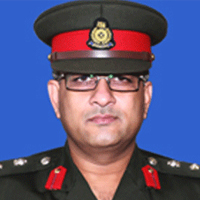 |
| Brigadier Ruwan Wanigasuriya |
”A section of the Colombo-based international press had been trying to influence the local media over accountability and media issues, the Brigadier alleged. He urged the media not to be a destabilizing factor and engage in actions inimical to national interests, though the military wouldn’t dispute the right of the media to report whatever incidents.”
Sri Lanka needs foreign help to establish war death toll – military spokesman
Ongoing efforts to ascertain the number of persons, including LTTE cadres, killed during eelam war IV (July 2006-May 2009)and deaths caused due to natural causes as well as accidents, had been hampered by the reluctance on the part of countries accommodating those making accusations to share information with the Sri Lanka government, government sources said.
Military spokesman Brigadier Ruwan Wanigasuriya told The Island that an accurate assessment of the number of Sri Lankan migrants was prerequisite for a methodical inquiry. He said that some of those categorized as dead and missing since the conclusion of the conflict in May 2009, were now overseas.
The official alleged that some of those who had fled the country included LTTE cadres; though their families continued to insist they were civilians.
During a visit to Colombo last January Canadian Citizenship, Immigration and Multiculturalism Minister Jason Kenney revealed that over the past six years 25,000 Sri Lankans had been accepted as permanent residents.
Minister Kenney estimated the number of Sri Lankans domiciled in Canada at over 300,000.
Addressing a seminar in Colombo in August last year Defence Secretary Gotabhaya Rajapaksa revealed that after the conclusion of the conflict some of those accommodated at welfare camps escaped and their whereabouts remained unknown. The Defence Secretary said that 7,185 persons, who had left IDP camps on various grounds hadn’t come back and 1,380 fled from hospitals where they were receiving treatment. Some of them are believed to have fled the country.
Addressing a group of journalists at the Press Complaints Commission of Sri Lanka on Tuesday, Brigadier Wanigasuriya alleged that the country was under constant attack since the conclusion of the conflict, in May 2009, over accountability issues.
The US moved a second resolution targeting Sri Lanka at the United Nations Human Rights Council (UNHRC) sessions last month over accountability issues.
The military spokesman pointed out that Gordon Weiss, the then UN spokesperson in Sri Lanka during the final phase of the conflict, accused the military of killing 40,000 persons. The then BBC correspondent in Colombo Frances Harrison, too, alleged mass killings during the final phase of fighting on the Vanni front, Brigadier Wanigasuriya said, recalling the circumstances under which the UN overlooked one of its own reports, which dealt with the number of deaths in the Northern Province. The official alleged that the UN conveniently had forgotten about its own report as it had estimated the number of deaths, including those of the LTTE at over 7,000, hence clashed with various figures quoted by other interested parties.
A section of the Colombo-based international press had been trying to influence the local media over accountability and media issues, the Brigadier alleged. He urged the media not to be a destabilizing factor and engage in actions inimical to national interests, though the military wouldn’t dispute the right of the media to report whatever incidents.
Although the LTTE no longer posed a conventional military threat, some elements still remained committed to creating a separate state in the northern and east provinces of Sri Lanka, Brigadier Wanigasuriya said. While estimating the Sri Lankan Tamil Diaspora at around one million persons, the military official said that only a minute section of them were pursuing a hostile campaign. In spite of them being small in number, they were influential and extremely powerful, he said.
The Brigadier said that if those organizations representing the Diaspora were genuinely interested in establishing the number of dead and whereabouts of those currently listed missing, they should cooperate with the government.
Shamindra Ferdinando
IS